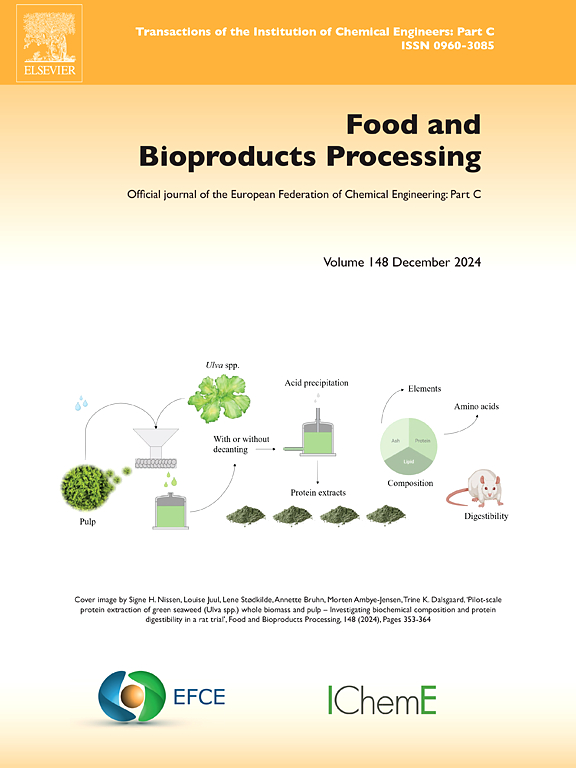High-efficiency and eco-friendly extraction of brown algal polyphenols using an optimized alcohol-salt aqueous two-phase system
IF 3.5
2区 农林科学
Q2 BIOTECHNOLOGY & APPLIED MICROBIOLOGY
引用次数: 0
Abstract
This study presents the development and optimization of an alcohol-salt aqueous two-phase system to extract and purify brown algal polyphenols from Laminaria japonica efficiently. A systematic investigation was conducted on the effects of various process parameters, including the type and concentration of alcohol and salt, temperature, and pH value, on extraction efficiency. Under optimal conditions, using 20 % ethanol and 22 % ammonium sulfate at 20 ℃ and a pH of 4, the extraction rate of polyphenols exceeded 80 % after three purification cycles, significantly enhancing antioxidant activity. Compared to traditional methods such as water-insoluble organic solvent liquid-liquid extraction and macroporous resin adsorption, the alcohol-salt aqueous two-phase system demonstrated superior performance, offering higher extraction efficiency and environmental sustainability. The recyclability of alcohol and salt further improved cost-effectiveness and reduced environmental impact. This study highlights the potential scalability and sustainability of the alcohol-salt aqueous two-phase system for producing high-purity natural antioxidants.
优化的醇盐双水相体系高效环保提取褐藻多酚
研究了一种醇盐双水相体系对海带褐藻多酚的高效提取和纯化。系统考察了醇盐种类、浓度、温度、pH值等工艺参数对提取效率的影响。在最佳条件下,以20 %乙醇和22 %硫酸铵为溶剂,在20 ℃和pH = 4的条件下,经过3次纯化,多酚的提取率超过80 %,显著提高了抗氧化活性。与传统的水不溶性有机溶剂液-液萃取、大孔树脂吸附等方法相比,醇盐双水相体系具有更高的萃取效率和环境可持续性。酒精和盐的可回收性进一步提高了成本效益,减少了对环境的影响。本研究强调了乙醇-盐双水相体系用于生产高纯度天然抗氧化剂的潜在可扩展性和可持续性。
本文章由计算机程序翻译,如有差异,请以英文原文为准。
求助全文
约1分钟内获得全文
求助全文
来源期刊

Food and Bioproducts Processing
工程技术-工程:化工
CiteScore
9.70
自引率
4.30%
发文量
115
审稿时长
24 days
期刊介绍:
Official Journal of the European Federation of Chemical Engineering:
Part C
FBP aims to be the principal international journal for publication of high quality, original papers in the branches of engineering and science dedicated to the safe processing of biological products. It is the only journal to exploit the synergy between biotechnology, bioprocessing and food engineering.
Papers showing how research results can be used in engineering design, and accounts of experimental or theoretical research work bringing new perspectives to established principles, highlighting unsolved problems or indicating directions for future research, are particularly welcome. Contributions that deal with new developments in equipment or processes and that can be given quantitative expression are encouraged. The journal is especially interested in papers that extend the boundaries of food and bioproducts processing.
The journal has a strong emphasis on the interface between engineering and food or bioproducts. Papers that are not likely to be published are those:
• Primarily concerned with food formulation
• That use experimental design techniques to obtain response surfaces but gain little insight from them
• That are empirical and ignore established mechanistic models, e.g., empirical drying curves
• That are primarily concerned about sensory evaluation and colour
• Concern the extraction, encapsulation and/or antioxidant activity of a specific biological material without providing insight that could be applied to a similar but different material,
• Containing only chemical analyses of biological materials.
 求助内容:
求助内容: 应助结果提醒方式:
应助结果提醒方式:


